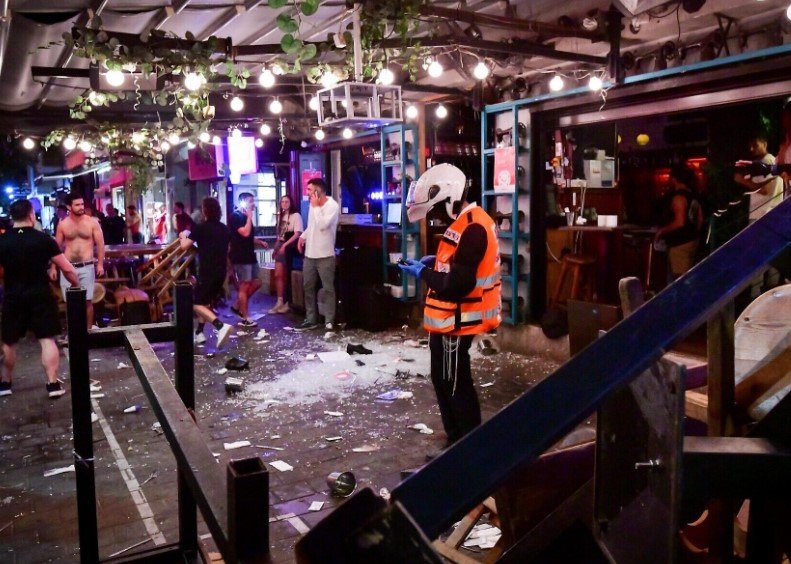Business on Allenby Street faces closure as police ramp up enforcement against unpermitted employment
A Tel Aviv bar-restaurant has been slapped with a closure order after police discovered it was employing two illegal residents from the West Bank. The men, both in their 30s, were arrested during a late-night raid and the business owner is now under investigation.
The incident, which unfolded in the heart of Allenby Street, highlights growing scrutiny on undocumented labor in Israel’s hospitality sector.
Officers say workers had no permits, lived on-site
The arrests followed an unannounced inspection by law enforcement units operating in the Carmel Market area. Police say they found the two men not only working at the establishment but also sleeping on the premises—raising concerns over both legal status and worker conditions.
The men, originally from Palestinian towns in the West Bank, had crossed into Israel without permits, police said.
“They had no work permits. No residency approvals. And they were staying in the business itself,” a police spokesperson confirmed Tuesday morning.
The closure order was signed shortly after the raid, effectively suspending the bar’s operations indefinitely.

Owner detained, questioned over illegal employment
The business owner, who has not been publicly named, was taken in for questioning and could face charges for employing individuals without permits—a violation of Israeli labor and security regulations.
Authorities are reportedly exploring whether this was a one-off case or part of a broader pattern.
This isn’t the first time Allenby Street has been in the spotlight. Known for its mix of hip bars, cheap eats, and underground clubs, the area is also a common target for labor enforcement.
“Hospitality businesses often bend the rules,” said a former labor inspector familiar with operations in Tel Aviv. “But this isn’t bending. This is straight-up illegal employment.”
Political climate adds heat to enforcement push
The case lands at a sensitive time, as tensions remain high between Israel and the Palestinian territories following recent security incidents.
Since early 2024, Israel has ramped up checks on illegal residents in major cities, especially in sectors known for employing low-wage labor—construction, cleaning, and hospitality.
Here’s what’s changed in recent months:
-
Interior Ministry directives now push for monthly sweeps of high-density business areas.
-
New surveillance tech is being used to identify possible illegal entrants.
-
Repeat offenders, both workers and employers, face steeper fines and longer jail terms.
Police are under clear instruction: crack down hard, especially in places frequented by tourists.
Allenby’s nightlife feels the chill
For many, this is yet another blow to the city’s fragile nightlife economy, which has already been hit by inflation, post-COVID business closures, and tighter regulation.
“The crackdown has everyone paranoid,” said Yael Naveh, a bartender at a nearby venue. “People are afraid to hire, afraid to speak openly, even afraid to take cash-in-hand jobs.”
The fear isn’t one-sided. Some business owners say the rules are being enforced inconsistently, leaving small venues vulnerable while larger chains go untouched.
One restaurant manager told us, “We’re not running sweatshops. But if you hire someone and their paperwork isn’t perfect, you’re treated like a criminal.”
Still, the law is clear—and the penalties aren’t minor.
What the law says, and what employers face
Under Israeli labor law, employing someone without a legal permit can lead to:
-
A fine of up to NIS 226,000 ($61,000) per illegal worker
-
Temporary or permanent closure of the business
-
Criminal charges in cases of repeat offenses or exploitation
A table comparing relevant enforcement actions in Tel Aviv this year:
| Enforcement Metric | Jan–Jul 2025 | Full Year 2024 |
|---|---|---|
| Businesses raided | 74 | 113 |
| Closure orders issued | 28 | 32 |
| Illegal workers arrested | 103 | 140 |
| Employers prosecuted | 21 | 26 |
While the numbers are small compared to the size of the sector, authorities say they send a message: rules are rules.
Public reaction is split, and so is political rhetoric
The public response has been mixed. On one hand, some Tel Aviv residents praised the action, citing security concerns.
“These people are entering the country illegally,” said one man near the scene of the raid. “What if they weren’t just looking for work?”
On the other hand, advocacy groups for migrant and Palestinian laborers argue the focus is misplaced.
“They’re going after bartenders instead of fixing the real issues,” said Rami Hassan of Workers Without Borders. “Everyone needs to eat, and this system gives people no legal way to do that.”
Lawmakers are split, too. While right-wing parties call for even tougher penalties, some on the center-left have warned against “over-securitizing” a labor issue.
Either way, for the bar on Allenby Street—and the two men now in detention—the damage is already done.
